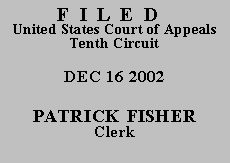

| JOHN JOSEPH WILLIAMS, |
|
Before EBEL, LUCERO, and O'BRIEN, Circuit Judges.
After examining the briefs and appellate record, this panel has determined
unanimously that oral argument would not materially assist the determination of
this appeal. See Fed. R. App. P. 34(a)(2); 10th Cir. R. 34.1(G). The case is
therefore ordered submitted without oral argument.
John Williams appeals the district court dismissal with prejudice of his pro se complaint for lack of subject matter jurisdiction and failure to state a claim upon which relief can be granted.(1) Exercising jurisdiction under 28 U.S.C. § 1291, we affirm.
We review de novo the dismissal of a complaint for lack of subject matter jurisdiction, King v. United States, 301 F.3d 1270, 1273 (10th Cir. 2002), and failure to state a claim upon which relief can be granted, Moffett v. Halliburton Energy Servs., Inc., 291 F.3d 1227, 1231 (10th Cir. 2002). In the latter instance, "all well-pleaded allegations in the . . . complaint are accepted as true and viewed in the light most favorable to the nonmoving party." Id. (quotation marks and citation omitted). While we are obligated to "liberally construe the allegations of a pro se complaint," Hunt v. Uphoff, 199 F.3d 1220, 1223 (10th Cir. 1999) (citation omitted), we cannot rely on "conclusory allegations" to sustain it, Mitchell v. King, 537 F.2d 385, 386 (10th Cir. 1976). Nor can we "supply additional factual allegations to round out a plaintiff's complaint or construct a legal theory on a plaintiff's behalf." Whitney v. State of N.M., 113 F.3d 1170, 1173-74 (10th Cir. 1997).
Mr. Williams filed a seventy-three count complaint alleging the Defendants committed various federal statutory and constitutional violations stemming from his overnight involuntary detention in the psychiatric ward of the Veterans Administration (V.A.) Medical Center in Albuquerque, New Mexico on October 14, 1999. He also asserts the Defendants conspired to deprive him of mental health treatment outside of the V.A. system.
The district court correctly relied on the doctrine of sovereign immunity and dismissed all claims against the United States for lack of jurisdiction. Fed. Deposit Ins. Corp. v. Meyer, 510 U.S. 471, 477 (1994) (barring suits for constitutional torts alleged against the government); Federal Tort Claims Act, 28 U.S.C. § 2680(h) (providing no cause of action against the United States "arising out of assault, battery, false imprisonment, false arrest, malicious prosecution, abuse of process, libel, slander, misrepresentation, deceit, or interference with contract rights"). We agree with the reasoning of the district court that, fairly construed, Mr. Williams's complaints against the United States rest alternatively on these two theories, and fail for want of jurisdiction.
Against the federal officials, Mr. Williams in effect alleged constitutional torts under Bivens v. Six Unknown Named Agents of Federal Bureau of Narcotics, 403 U.S. 388, 389 (1971) (styled in many instances as alleged civil rights violations under 42 U.S.C. §§ 1985(3) and 1986), together with non-constitutional torts under the Federal Tort Claims Act. The district court dismissed the constitutional tort and statutory civil rights claims for failure to state a claim upon which relief can be granted. Fed. R. Civ. P. 12(b)(6). A careful review of the record, which is replete with attenuated and conclusory allegations, sustains this decision. We agree with the district court that one cannot construe Mr. Williams's overnight detention as an intentional violation of his constitutional rights at the hands of federal officials. Nor can we identify any facts to suggest these officials conspired in any way to deny Mr. Williams access to or funding for therapy outside the V.A. system. In particular, Mr. Williams's personal conflict with Representative Udall has no remedy at law without a cognizable, factually supported cause of action, not present here. Also, the district court correctly dismissed the claims brought under the Federal Tort Claims Act for lack of jurisdiction because such claims are properly brought only against the United States and not against individual officers of the United States. 28 U.S.C. § 2679(b)(1) and (d)(1).
The district court rightly dismissed the claims against the ten Unknown Does for failure to factually connect any of them to a cause of action, and correctly disposed of all remaining motions filed by Mr. Williams as being moot in light of the dismissal of his claims.
Mr. Williams complains on review he was not given an opportunity to amend his pleadings in order to survive a dismissal. But refusal to grant leave to amend is an exercise of discretion, Calderon v. Kan. Dep't of Soc. & Rehab. Servs., 181 F.3d 1180, 1187 (10th Cir. 1999), not abused here. Even sua sponte dismissals without notice of opportunity to amend are permitted in instances, like this one, where it is "patently obvious that the plaintiff could not prevail on the facts alleged, . . . and allowing him an opportunity to amend his complaint would be futile . . . ." McKinney v. State of Okla., Dep't. of Human Servs., Shawnee, OK, 925 F.2d 363, 365 (10th Cir. 1991) (quotation marks and citations omitted).
Last, we reject Mr. Williams's submission of supplementary authority under Fed. R. App. P. 28(j) because it consists of additional factual allegations rather than legal authority, as required by the rule.
We AFFIRM the judgment of the district court.
Entered by the Court:
TERRENCE L. O'BRIEN
United States Circuit Judge
*. This order and judgment is not binding precedent except under the doctrines of law of the case, res judicata and collateral estoppel. The court generally disfavors the citation of orders and judgments; nevertheless, an order and judgment may be cited under the terms and conditions of 10th Cir. R. 36.3.
1.The district court issued two separate orders of dismissal: one addressed the claims against the United States, Mr. Browne, Drs. Katzman and Moyers, and the ten "Unknown Does"; the other addressed the claim against Congressman Udall. Mr. Williams seeks review of both dismissals.